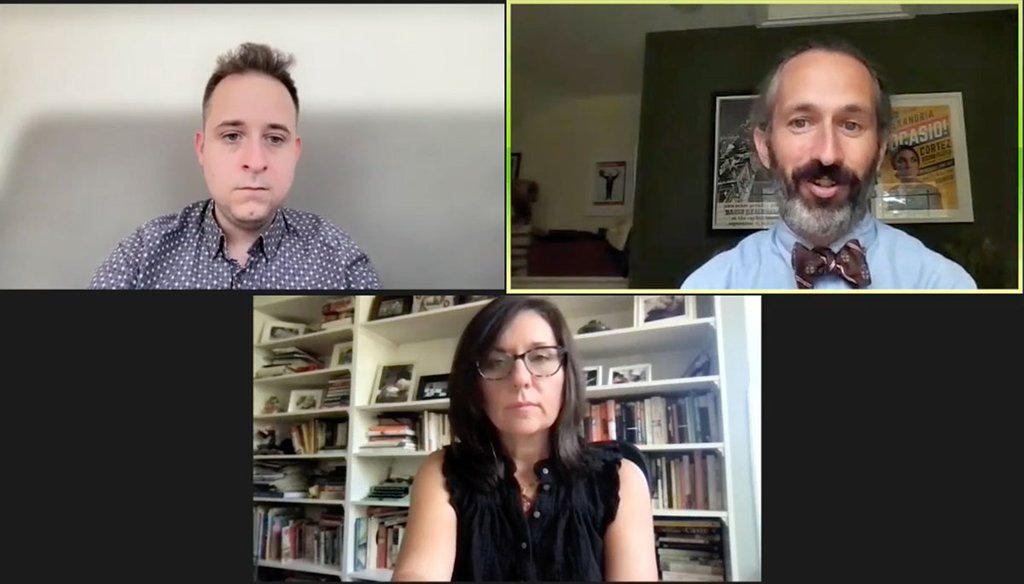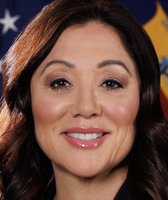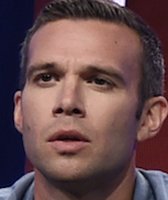Stand up for the facts!
Our only agenda is to publish the truth so you can be an informed participant in democracy.
We need your help.
I would like to contribute

From left, the University of California, Berkeley’s David Broockman and Microsoft Research’s David Rothschild discuss cable news on Sept. 27, 2022, at PolitiFact's United Facts of America conference. PolitiFact Deputy Editor Rebecca Catalanello moderated.
How do you get dedicated Fox News viewers to drop Tucker Carlson for a month and change the channel?
Researchers from the University of California, Berkeley and Yale University landed on one solution for a September 2020 experiment: cash.
The study, a piece of research discussed in a first-day session of United Facts of America: A Festival of Fact-Checking, was a firsthand look at how television news can form stronger partisan bubbles than news gleaned from the internet.
UC Berkeley’s David Broockman and Microsoft Research’s David Rothschild presented research on partisan television news diets and echo chambers, which they found to be more partisan and persistent than ones from online news consumption.
"Partisan media exercises real power, in part because its consumers don’t want to watch alternatives," Broockman said.
Sign up for PolitiFact texts
What happens if you pay Fox News viewers to watch CNN for a month?
Broockman wanted to test what researchers call "selective exposure," the idea that audiences prefer media that aligns with their existing point of view.
He and Yale University’s Joshua Kalla decided to try it with dedicated Fox News viewers for their field experiment.
They paid a randomized treatment group to watch CNN for a month — September 2020, amid COVID-19 and leading up to the 2020 presidential election — and surveyed both the treatment group and a control group weekly on what they were watching.
After four weeks of incentivized CNN-watching, the treatment group was more aware of a channel’s agenda setting in coverage topics, more aware of what former President Donald Trump’s positions were, believed less misinformation about President Joe Biden and changed its view on issues like mail-in voting.
"People were a lot less likely to agree that what Fox News was covering was important," Broockman said.
Viewers were also more likely to have a liberal perception of events, such as not believing that Joe Biden’s election would lead to protests being more violent or thinking Trump wasn’t taking adequate safety precautions at his rallies. They were also less likely to believe that Fox News would ever discuss something negative about Trump.
Most participants stopped watching CNN and returned to watching Fox News once the payments stopped.
"It really puts the responsibility on the networks and the carriers to say, look, you can’t just have 100% propaganda for one side," Broockman said. "Imagine if even 5% of Fox News’ content was, ‘Trump’s great! But here’s one thing he could have been doing better.’"
Understanding the echo chamber
Rothschild, meanwhile, wanted to better understand the echo chamber built by these partisan news diets, how long people lasted in them and what information the people were seeing.
Rothschild’s research found that television echo chambers were more persistent and less likely to include any nonpartisan information than online echo chambers.
"On television, people persist month after month, he said. "Online, even where these echo chambers exist, people are just cycling in and out."
How people find news on television versus the internet could account for the difference, Rothschild said. Online news consumption tends to happen at hubs, which can offer more balance as headlines come from different sources.
With television, a viewer sets a channel and it stays. "That default is extremely powerful," Rothschild said.
On partisan television, debate is limited and legitimacy is lacking, Rothschild said. He specifically pointed to journalists like Shep Smith and Chris Wallace leaving Fox News as a crucial loss.
"That’s something that they used to lean on for legitimacy and to occasionally challenge their viewers," he said. "They’ve jettisoned actual news and they’ve jettisoned debate in any actual way, and that’s pretty discouraging."
RELATED: United Facts of America: Experts say facts alone won't bridge the partisan divide
Our Sources
Listed in the story.























